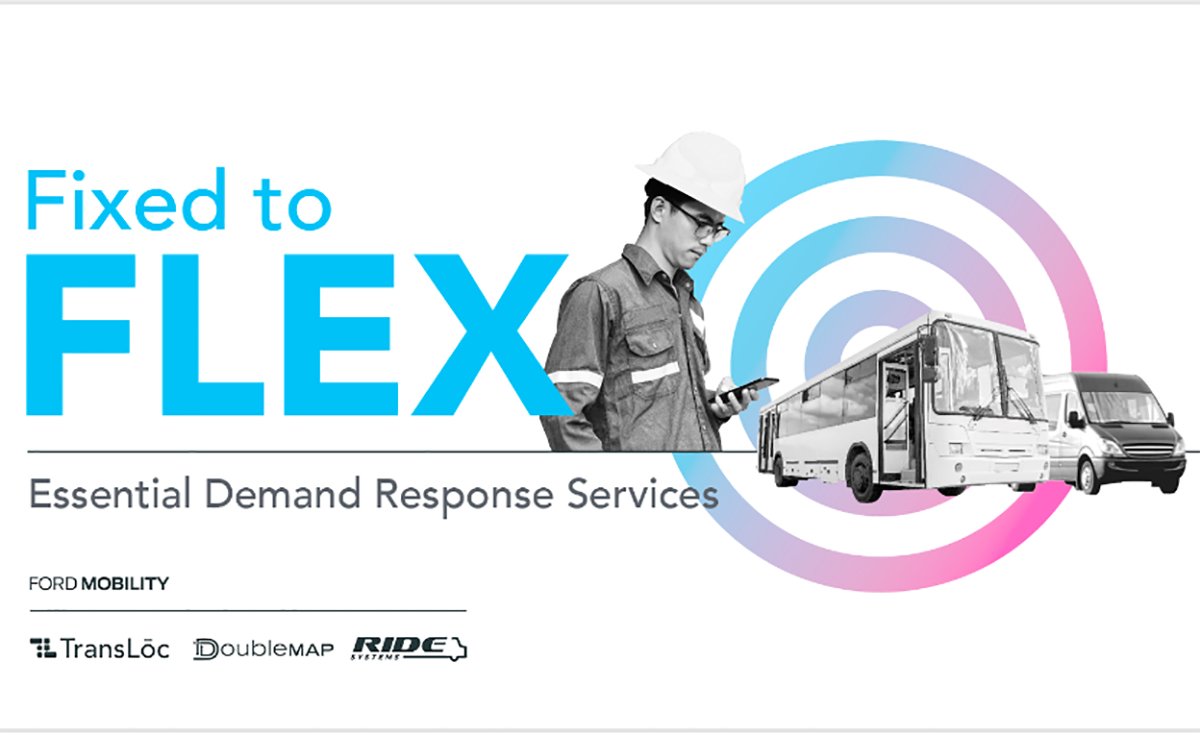| Ford Mobility subsidiaries aid transit agencies during COVID-19 |

As the nation hunkers down to help slow the spread of COVID-19, cities are experiencing a decrease in traffic congestion and in some cases a decline in public transit use.
But people – especially critical personnel for essential industries – still need to get around, leaving transit agencies in major metropolitan areas to manage an unprecedented and sudden shift in operations.
Ridership and demand for services have fallen on some routes but increased on others.
Major transit systems also have been facing challenges with cleaning, staffing and other issues.
To help transit agencies respond to today’s evolving rider demand and other challenges, Ford Mobility subsidiaries TransLoc, Ride Systems and DoubleMap are offering free consulting and rider demand response software. Transloc is a software provider for transit agencies. Ride Systems and DoubleMap provide automatic vehicle location services.
The aim is to help transit agencies navigate complexities as they juggle fixed routes, on-demand services, microtransit and paratransit operations. Some agencies also are having to reduce their services to provide only for essential workers, limit routes with empty buses and minimize losses associated with varying drops in ridership.
“Transit providers are currently operating in uncharted territory,” said Justin Rees, CEO of Ford Mobility’s TransLoc, Ride Systems and DoubleMap, in a statement.
Uncharted territory, indeed. While some mobility companies have been forced to scale back, others, such as scooter company Spin and car-sharing service Zipcar, are pivoting their services to help during the pandemic.
–Alexa St. John
What you need to know
Nuro gets green light in California Self-driving startup Nuro received a permit this week that allows the company to begin testing its driverless delivery vehicles on certain California roadways. The permit issued by the state’s Department of Motor Vehicles allows two of the company’s R2 prototypes to test in nine California cities. Although there are dozens of companies that test autonomous vehicles in the state, Nuro is just the second granted the right to test vehicles without a human safety driver aboard. Waymo was the first company to receive a driverless permit in California.
Zipcar expands same-vehicle option Car-sharing service Zipcar expanded its Dedicated Zipcar vehicle program in response to demands brought on by the COVID-19 pandemic. The program grew this week in 10 cities and launched in 14 others. Dedicated Zipcar provides members exclusive access to keep the same vehicle Monday through Friday.
GM to co-develop EVs for Honda General Motors will help develop two new electric vehicles for Honda that will be powered by GM’s upcoming Ultium batteries. Honda will design the interior and exterior of the vehicles. They will ride on GM’s global EV platform, which “will be engineered to support Honda’s driving character,” the companies said in a joint statement. GM will build the EVs at its North American plants, and sales are expected to begin in the 2024 model year in Honda’s U.S. and Canadian markets.
Roundup
Self-driving startup Zoox has laid off its safety drivers, at least for a while.
For battery challenger SK Innovation of South Korea it’s build, build, build.
Uber has paused construction at the Old Post Office in Chicago, Crain’s Chicago Business reports. The company is basing Uber Freight, its logistics business, in the office building. The delay will push its move-in date from this fall to next year.
Meanwhile, Uber plans to start shipping car disinfectant to drivers.
Tesla nears debut of longer-range Model 3 in China.
Brain food
With EV deal, Honda plays catch-up and GM polishes its engineering chops.
Last mile
Tesla is working on a new ventilator design using a Model 3 screen.